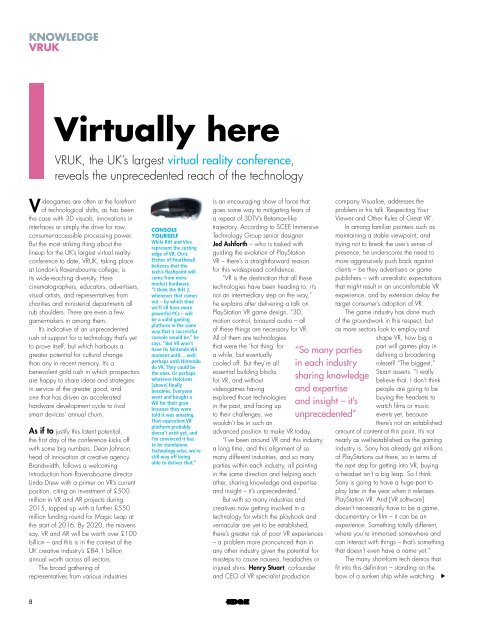Create successful ePaper yourself
Turn your PDF publications into a flip-book with our unique Google optimized e-Paper software.
Knowledge<br />
VRUK<br />
Virtually here<br />
VRUK, the UK’s largest virtual reality conference,<br />
reveals the unprecedented reach of the technology<br />
ideogames are often at the forefront<br />
V of technological shifts, as has been<br />
the case with 3D visuals, innovations in<br />
interfaces or simply the drive for raw,<br />
consumer-accessible processing power.<br />
But the most striking thing about the<br />
lineup for the UK’s largest virtual reality<br />
conference to date, VRUK, taking place<br />
at London’s Ravensbourne college, is<br />
its wide-reaching diversity. Here<br />
cinematographers, educators, advertisers,<br />
visual artists, and representatives from<br />
charities and ministerial departments all<br />
rub shoulders. There are even a few<br />
game-makers in among them.<br />
It’s indicative of an unprecedented<br />
rush of support for a technology that’s yet<br />
to prove itself, but which harbours a<br />
greater potential for cultural change<br />
than any in recent memory. It’s a<br />
benevolent gold rush in which prospectors<br />
are happy to share ideas and strategies<br />
in service of the greater good, and<br />
one that has driven an accelerated<br />
hardware development cycle to rival<br />
smart devices’ annual churn.<br />
As if to justify this latent potential,<br />
the first day of the conference kicks off<br />
with some big numbers. Dean Johnson,<br />
head of innovation at creative agency<br />
Brandwidth, follows a welcoming<br />
introduction from Ravensbourne director<br />
Linda Drew with a primer on VR’s current<br />
position, citing an investment of £500<br />
million in VR and AR projects during<br />
2015, topped up with a further £550<br />
million funding round for Magic Leap at<br />
the start of <strong>2016</strong>. By 2020, the mavens<br />
say, VR and AR will be worth over £100<br />
billion – and this is in the context of the<br />
UK creative industry’s £84.1 billion<br />
annual worth across all sectors.<br />
The broad gathering of<br />
representatives from various industries<br />
ConSole<br />
YoURSelF<br />
While Rift and Vive<br />
represent the cutting<br />
edge of VR, Chris<br />
Etches of Fourthwall<br />
believes that the<br />
tech’s flashpoint will<br />
come from more<br />
modest hardware.<br />
“I think the Rift 2,<br />
whenever that comes<br />
out – by which time<br />
we’ll all have more<br />
powerful PCs – will<br />
be a valid gaming<br />
platform in the same<br />
way that a successful<br />
console would be,” he<br />
says. “But VR won’t<br />
have its Nintendo Wii<br />
moment until… well,<br />
perhaps until Nintendo<br />
do VR. They could be<br />
the ones. Or perhaps<br />
whatever HoloLens<br />
[above] finally<br />
becomes. Everyone<br />
went and bought a<br />
Wii for their gran<br />
because they were<br />
told it was amazing.<br />
That equivalent VR<br />
platform probably<br />
doesn’t exist yet, and<br />
I’m convinced it has<br />
to be standalone.<br />
Technology-wise, we’re<br />
still way off being<br />
able to deliver that.”<br />
is an encouraging show of force that<br />
goes some way to mitigating fears of<br />
a repeat of 3DTV’s Betamax-like<br />
trajectory. According to SCEE Immersive<br />
Technology Group senior designer<br />
Jed Ashforth – who is tasked with<br />
guiding the evolution of PlayStation<br />
VR – there’s a straightforward reason<br />
for this widespread confidence.<br />
“VR is the destination that all these<br />
technologies have been heading to; it’s<br />
not an intermediary step on the way,”<br />
he explains after delivering a talk on<br />
PlayStation VR game design. “3D,<br />
motion control, binaural audio – all<br />
of these things are necessary for VR.<br />
All of them are technologies<br />
that were the ‘hot thing’ for<br />
a while, but eventually<br />
cooled off. But they’re all<br />
essential building blocks<br />
for VR, and without<br />
videogames having<br />
explored those technologies<br />
in the past, and facing up<br />
to their challenges, we<br />
wouldn’t be in such an<br />
advanced position to make VR today.<br />
“I’ve been around VR and this industry<br />
a long time, and this alignment of so<br />
many different industries, and so many<br />
parties within each industry, all pointing<br />
in the same direction and helping each<br />
other, sharing knowledge and expertise<br />
and insight – it’s unprecedented.”<br />
But with so many industries and<br />
creatives now getting involved in a<br />
technology for which the playbook and<br />
vernacular are yet to be established,<br />
there’s greater risk of poor VR experiences<br />
– a problem more pronounced than in<br />
any other industry given the potential for<br />
missteps to cause nausea, headaches or<br />
injured shins. Henry Stuart, co-founder<br />
and CEO of VR specialist production<br />
“So many parties<br />
in each industry<br />
sharing knowledge<br />
and expertise<br />
and insight – it’s<br />
unprecedented”<br />
company Visualise, addresses the<br />
problem in his talk ‘Respecting Your<br />
Viewer and Other Rules of Great VR’.<br />
In among familiar pointers such as<br />
maintaining a stable viewpoint, and<br />
trying not to break the user’s sense of<br />
presence, he underscores the need to<br />
more aggressively push back against<br />
clients – be they advertisers or game<br />
publishers – with unrealistic expectations<br />
that might result in an uncomfortable VR<br />
experience, and by extension delay the<br />
target consumer’s adoption of VR.<br />
The game industry has done much<br />
of the groundwork in this respect, but<br />
as more sectors look to employ and<br />
shape VR, how big a<br />
part will games play in<br />
defining a broadening<br />
ruleset? “The biggest,”<br />
Stuart asserts. “I really<br />
believe that. I don’t think<br />
people are going to be<br />
buying the headsets to<br />
watch films or music<br />
events yet, because<br />
there’s not an established<br />
amount of content at this point. It’s not<br />
nearly as well-established as the gaming<br />
industry is. Sony has already got millions<br />
of PlayStations out there, so in terms of<br />
the next step for getting into VR, buying<br />
a headset isn’t a big leap. So I think<br />
Sony is going to have a huge part to<br />
play later in the year when it releases<br />
PlayStation VR. And [VR software]<br />
doesn’t necessarily have to be a game,<br />
documentary or film – it can be an<br />
experience. Something totally different,<br />
where you’re immersed somewhere and<br />
can interact with things – that’s something<br />
that doesn’t even have a name yet.”<br />
The many short-form tech demos that<br />
fit into this definition – standing on the<br />
bow of a sunken ship while watching<br />
8




